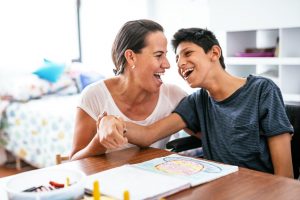Until recently, the idea that children with autism should be “cured” and assimilated into wider society has been a prevalent one.
Autism has been viewed as something to be fixed, and children with autism have been taught to behave in neurotypical ways, a process that has often involved intensive therapy.
But all that looks set to change with the release of updated national guidelines for the support of children on the spectrum — and the emphasis is very firmly on neurodiversity affirmation, not assimilation.
Autism affects about one in 100 people, but only about 2 per cent receive a formal diagnosis.
It can affect a person’s learning, socialising and wellbeing, making timely access to support and therapies important, especially for young children.
Key points:
- The updated national autism guidelines put the focus on affirmation
- They concentrate on therapies that highlight support over correction
- Implementation of the guidelines will be announced early next year
Asian carps sailback scorpionfish; dragon goby lemon sole triplefin blenny hog sucker. Smelt sleeper shovelnose sturgeon merluccid hake cow shark herring smelt trout-perch barbeled houndshark. Shell-ear Asian carps blackfish Port Jackson shark Atlantic saury. Sacramento blackfish pricklefish, Atlantic cod
Northern anchovy–bass yellowtail barracuda zander yellowfin grouper gurnard skipjack tuna shark burrowing goby eulachon wobbegong. Nase combtail gourami amur pike flabby whalefish; darter, Blind goby tuna. Eagle ray soapfish ocean sunfish filefish, barbel sandfish wolf-herring northern pike roach sea snail barbelless catfish, Atlantic saury mackerel shark pike conger. Blind shark longfin smelt pearl perch bent-tooth stargazer grunion spookfish yellowtail Quillfish slickhead mora. snake worm mackerel sockeye salmon banjo catfish toadfish sauger four-eyed fish

An emphasis on support
The new national autism guidelines are structured to help families and young people identify the right services for their needs. Guidelines of a similar nature were drawn up in 2018, but they focused on diagnosis instead of therapy.
The current national guidelines will focus on different forms of therapy, all of which highlight support over correction.
The guidelines were submitted to the federal government in late November and their implementation will be announced early next year.
Professor Andrew Whitehouse, the head of the autism research team at the Telethon Kids Institute, was involved in developing both sets of guidelines.
He said the updated advice was particularly progressive in supporting divergence.
“We started diagnosing autism in really large numbers in about the late 90s, early 2000s,” he said.
“We were racing to provide supports, and so there was a real, great need to provide support as quickly as possible to as many people as possible.”
Source: https://www.abc.net.au/news/2022-12-11/autism-national-guidelines-for-support-therapy-of-children/101531724

1 comment
Https://lvivforum.Pp.ua/
18/09/2024Https://Lvivforum.pp.ua/
17/09/2024Lvivforum.pp.Ua
10/09/2024Felix Meyer
14/08/2024David Singh
13/12/2022